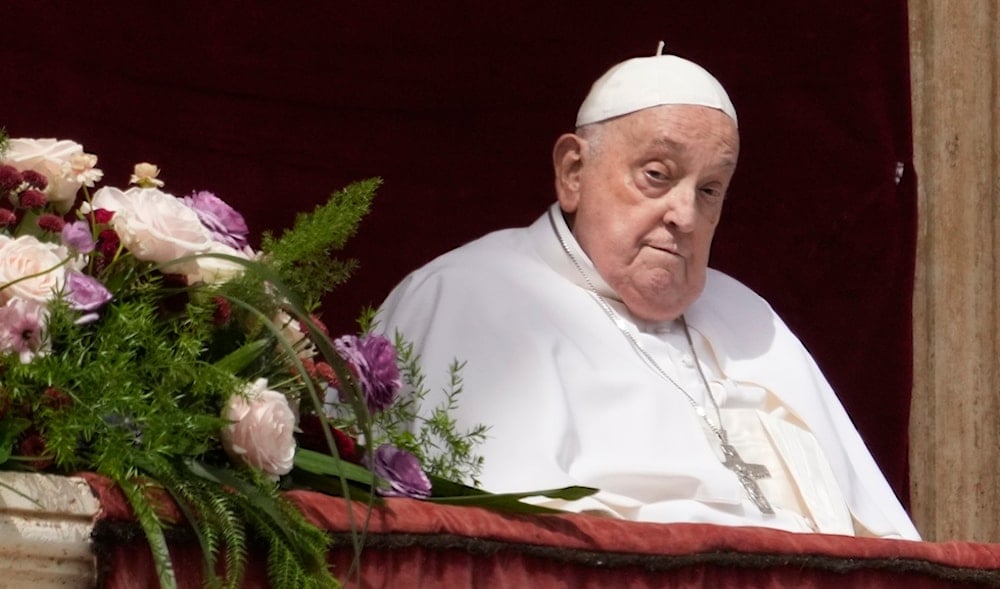Pope Francis dies at 88 after battle with pneumonia
Pope Francis dies at 88 of pneumonia and other health complications, leaving behind a legacy of global Catholic transformation.
-

Pope Francis appears on the central lodge of St. Peter's Basilica to bestow the Urbi et Orbi blessing at the end of the Easter mass in St. Peter's Square at the Vatican Sunday, April 20, 2025. (AP)
Pope Francis, the first Jesuit and first Latin American pontiff, passed away on Monday at the age of 88 after a long battle with health issues, including double pneumonia.
The Vatican confirmed the news in a statement issued by Cardinal Kevin Farrell.
“Dearest brothers and sisters, it is with deep sorrow that I must announce the death of our Holy Father Francis,” Cardinal Farrell said via the Vatican's Telegram channel.
“This morning at 7:35 am (0535 GMT), the Bishop of Rome, Francis, returned to the home of the Father. His entire life was dedicated to the service of the Lord and His church.”
With his passing, traditional Vatican protocols have begun, including preparations for a conclave to select his successor.
Until then, the governance of Vatican City will fall to the camerlengo, currently Dublin-born Cardinal Kevin Farrell.
A humble reformer from Argentina
Born Jorge Mario Bergoglio in Buenos Aires, Francis became pope in March 2013 following the resignation of Benedict XVI, the first papal resignation in over 600 years.
Francis quickly established a different approach: less ceremonial, more people-centered, and viewed as openly reformist.
He chose to be buried not in St. Peter’s Basilica but in the Santa Maria Maggiore Basilica in Rome, making him the first pope in over a century to be buried outside the Vatican.
He also rejected the tradition of being buried in three coffins, opting instead for a single wooden and zinc casket.
Target of critics
Francis promoted social justice, defended migrants, and spoke urgently on environmental issues. He also pushed internal reforms in Vatican governance and tried to confront the global clerical abuse crisis.
However, his critics accused him of doctrinal ambiguity and said he failed to defend traditional teachings on abortion and divorce.
His attempts to balance compassion with Church orthodoxy frequently stirred tension, particularly with conservative factions.
Health challenges
Francis had spent 38 days in Rome's Gemelli hospital before being discharged on March 23. His death came just one day after he appeared on the balcony of Saint Peter’s Basilica for Easter Sunday, spiritedly greeting worshippers.
Despite ongoing health concerns, including lung surgery in his youth, colon surgery in 2021, and a hernia operation in 2023, Francis refused to slow down.
He was often seen in a wheelchair due to knee pain and had fallen several times in recent months.
Still, he maintained a packed schedule, recently meeting the Slovak prime minister and even embarking on a four-nation Asia-Pacific tour in 2024.
His weekly Angelus addresses drew large crowds, with the pope often ending them by saying, “Pray for me and have a good lunch.”
Legacy of reform
When Francis ascended to the papacy, the Catholic Church was reeling from decades of sexual abuse scandals and internal divisions.
He worked to revise canon law and open leadership roles in Vatican offices to laypeople.
His later years saw growing opposition from conservative cardinals, especially during the Vatican’s Synod in late 2023, part of a wide-ranging global consultation on the Church’s future, a process that now remains unfinished.
Pope's last call: Ceasefire in Gaza
Only a day before his passing, Pope Francis delivered a powerful Easter message calling for an immediate ceasefire in Gaza, the release of captives, and global action against 'rising antisemitism'.
In a statement read aloud by an aide, the Pope’s Easter message described the situation in Gaza as “dramatic and deplorable.” He urged all warring parties to agree to an immediate ceasefire.
“I appeal to the warring parties: call a ceasefire, release the hostages, and come to the aid of a starving people that aspires to a future of peace,” the statement read.
Francis also expressed “closeness to the sufferings of all the Israeli people and the Palestinian people,” while warning of what he described as a “worrisome” global trend of antisemitism.

 4 Min Read
4 Min Read










